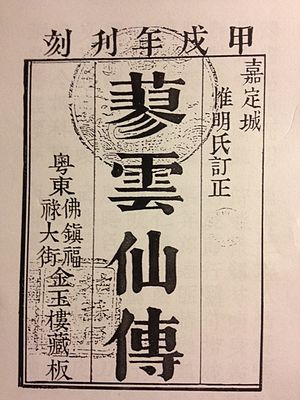Lục Vân Tiên

The Tale of Lục Vân Tiên (蓼雲仙傳 or 陸雲僊; Truyện Lục Vân Tiên) is a 19th-century Vietnamese-language epic poem written in vernacular Chữ Nôm script by the blind poet Nguyễn Đình Chiểu (1822–1888).[1]
The 2082-line (present version) work is one of the two most recognizable and influential epic poems in Vietnamese (the other being The Tale of Kiều by Nguyễn Du).[2] Its reaffirmation of Vietnam's traditional moral virtues, at a time when Vietnamese society was facing the French invasion, had great popular appeal.
Plot[]
Perhaps the best English language summary of Luc Van Tien is one given by Professor John C. Schafer in his essay "Luc Van Tien: Its Relation to Prior Texts."[3] Here is his summary:
As the story opens, Luc Van Tien, the main character, says goodbye to his teacher at the Confucian school and sets off for the capital to take the examinations to become a mandarin. On the way he runs across some brigands who have kidnapped the beautiful Kieu Nguyet Nga. Tien rescues her and the gratitude she feels for him soon becomes mixed with love. To express her appreciation, she writes him a poem, but then they part. Nga returns to Ha-khe, where her father is an official, and draws a portrait of Tien to help her remember her absent lover; Tien continues on to the examination site. On the way he stops off at the home of Va The Loan, a girl with whom his parents have arranged a marriage. After spending some time with Loan's parents, who seem pleased with the prospect of their daughter marrying the young talented scholar, he continues on his way. On his journey he meets three fellow examination candidates, one of whom turns out to be a loyal friend, two of whom become jealous and vindictive villains.
Unfortunately Tien never gets to the examinations. Before he is to sit for them, he hears that his mother has died and decides immediately to return to participate in her funeral. During his return journey he becomes so sick and weak from weeping that he eventually goes blind. Wandering blind and unprotected around the countryside, he becomes an easy victim for deceitful fortune tellers, medicine men, and sorcerers who trick him out of his money. A villainous fellow examination candidate and his future in-laws treat him even more cruelly. The examination candidate, jealous of Tien's superior talent, pushes him into a river, and Tien's in-laws. afraid they will be stuck with a worthless blindman for a son-in-law, leave him to die in a cave. But, as the narrator frequently reminds his readers, the agents of mercy look after the virtuous. A friendly river dragon saves Tien from drowning, and a fairy leads him out of the cave. Finally, through the help of a woodcutter, he ends up in a pagoda, where the narrator allows him to rest while recounting the misfortunes of the heroine Nga.
Nga, still pining for Tien ever since he so gallantly rescued her, learns from his father, mistakenly as it turns out, that he has died from sickness. She vows to remain chaste and loyal forever in his memory. Keeping her vow is not easy because she has other suitors, one of whom, when spurned, seeks revenge by influencing the King of So to have her offered as a tribute wife to the King of Phien, a country that has been harassing the country of So. Nga then must choose between two virtues: faithfulness to Tien, whom she regards as her husband even though they were never formally betrothed, and loyalty to her King, who has ordered her to become the wife of a foreign king. Unable to resolve this dilemma, she attempts suicide by jumping off the boat taking her to the land of Phien. She is saved by the Buddhist Goddess of Mercy, who removes her from the water and places her in a garden of flowers. The aging caretaker of the garden befriends her, but when his son (Bui Kiem) makes advances, she flees, finally finding refuge in the home of a kind old woman.
The narrator then returns to the adventures of Tien, who begins to enjoy better fortune. After being blind for six years, he is cured by a fairy who visits him in a dream, bringing him a bowl of magic medicine. His sight restored, he begins his rise to fame and happiness. He reviews his lessons and takes the examinations, passing with the highest rank. At the King's request he leads a successful expedition against the O-Qua, a neighboring people who have been harassing the land of Sd~ After this battle he stumbles upon the old lady's home where Nga has taken refuge. There is a joyful reunion. Later they are happily married and the King of S6, grateful for Tien's assistance in driving out the O-Qua, and himself eager to retire to a pagoda, allows Tien to take the throne and rule the country. This summary in English proves the maxim "To translate is to betray," not only because the rich elaborating detail and the music of verse are lost but also because it fails to evoke in Western listeners certain prior texts a knowledge of which is essential to proper appreciation.
Text[]
The first six lines of the poem are:
畧畑䀡傳西銘